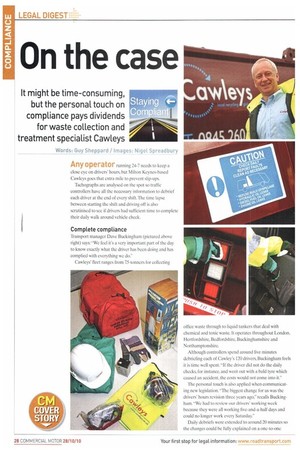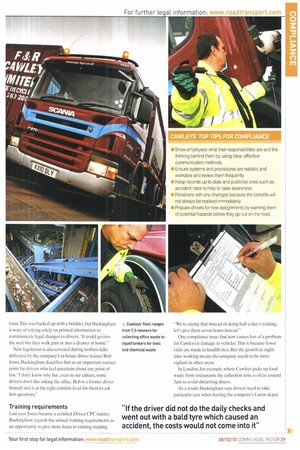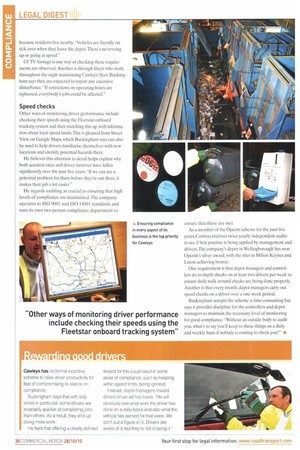On the case
Page 28

Page 29

Page 30

If you've noticed an error in this article please click here to report it so we can fix it.
It might be time-consuming, but the personal touch on compliance pays dividends for waste collection and treatment specialist Cawleys
Words: Guy Sheppard / Images: Nigel Spread bury Any operator running 24-7 needs to keep a close eye on drivers hours, hut Milton Keynes-based Cawleys goes that extra mile to prevent slip-ups.
Tachographs are analysed on the spot so traffic controllers have all the necessary information to debrief each driver at the end of every shift. The time lapse between starting the shift and driving off is also scrutinised to see if drivers had sufficient time to complete their daily walk around vehicle check.
Complete compliance
Transport manager Dave Buckingham (pictured above right) says: "We feel it's a very important part of the day to know exactly what the driver has been doing and has complied with everything we do."
Cawleys' fleet ranges from 7.5-tonners for collecting office waste through to liquid tankers that deal with chemical and toxic waste. It operates throughout London, Hertfordshire, Bedfordshire, Buckinghamshire and Northamptonshire.
Although controllers spend around five minutes debriefing each of Cawley's 120 drivers, Buckingham feels it is time well spent. "If the driver did not do the daily checks, for instance, and went out with a bald tyre which caused an accident, the costs would not come into it." The personal touch is also applied when communicating new legislation. "The biggest change for us was the drivers' hours revision three years ago," recalls Buckingham. "We had to review our drivers' working week because they were all working five-and-a-half days and could no longer work every Saturday."
Daily debriefs were extended to around 20 minutes so the changes could be fully explained on a one-to-one basis.This was backed up with a booklet, but Buckingham is wary of relying solely on printed information to communicate legal changes to drivers. "It could go into the next bin they walk past or into a drawer at home."
New legislation is also covered during toolbox talks delivered by the company's in-house driver trainer Rob Jones. Buckingham describes him as an important contact point for drivers who feel uncertain about any point of law. "I don't know why but, even in our culture, sonic drivers don't like asking the office. Rob is a former driver himself and is at the right comfort level for them to ask him questions."
Training requirements
Last year Jones became a certilied Driver CPC trainer. Buckingham regards the annual training requirements as an opportunity to give more focus to existing training. "We're saying that instead of doing half-a-day's training, let's give them seven hours instead."
One compliance issue that now causes less of a problem for Cawleys is damage to vehicles. This is because fewer visits are made to landfill sites. But the growth in nighttime working means the company needs to be more vigilant in other areas.
In London, for example, where Cawleys picks up food waste from restaurants, the collection time is often around 3am to avoid disturbing diners.
As a result, Buckingham says drivers need to take particular care when leaving the company's Luton depot because residents live nearby. "Vehicles are literally on tick-over when they leave the depot. There's no revving up or going at speed."
CCTV footage is one way of checking these requirements are observed. Another is through fitters who work throughout the night maintaining Cawleys' fleet. Buckingham says they are expected to report any excessive disturbance. "If restrictions on operating hours are tightened, everybody's jobs could be affected."
Speed checks
Other ways of monitoring driver performance include checking their speeds using the Fleetstar onboard tracking system and then matching this up with information about local speed limits, This is gleaned from Street View on Google Maps, which Buckingham says can also be used to help drivers familiarise themselves with new locations and identify potential hazards there.
He believes this attention to detail helps explain why both accident rates and driver turnover have fallen significantly over the past five years. "If we can see a potential problem for them before they're out there. it makes their job a lot easier."
He regards auditing as crucial to ensuring that high levels of compliance are maintained. The company operates to ISO 9001 and ISO 14001 standards and runs its own two-person compliance department to ensure that these are met.
As a member of the Opcom scheme for the past five years, Cawleys receives twice-yearly independent audits to see if best practice is being applied by management and drivers. The company's depot in Wellingborough has won Opcom's silver award, with the sites in Milton Keynes and Luton achieving bronze.
One requirement is that depot managers and controllers do in-depth checks on at least two drivers per week to ensure daily walk around checks are being done properly. Another is that every month, depot managers carry out speed checks on a driver over a one-week period.
Buckingham accepts the scheme is time-consuming but says it provides discipline for the controllers and depot managers to maintain the necessary level of monitoring for good compliance. "Without an outside body to audit you, what's to say you'll keep to those things on a daily and weekly basis if nobody is coming to check you?"
























































































































